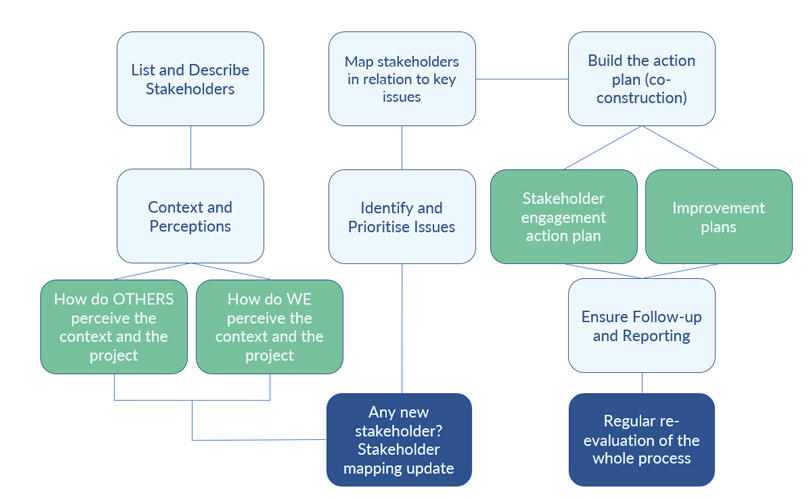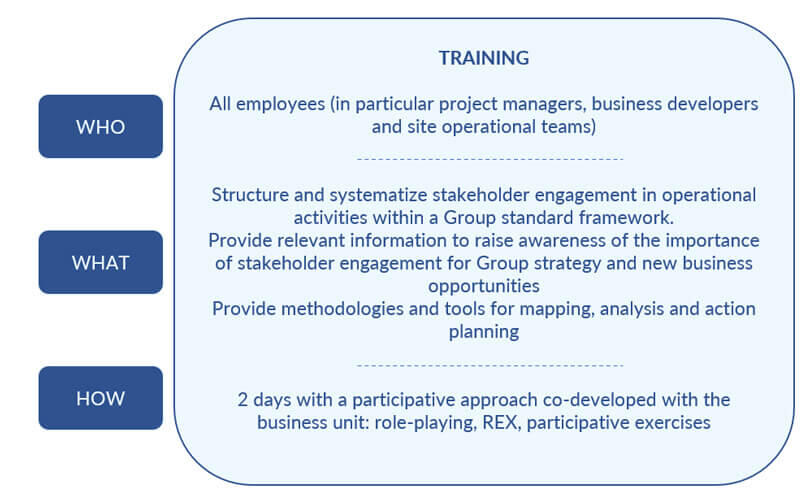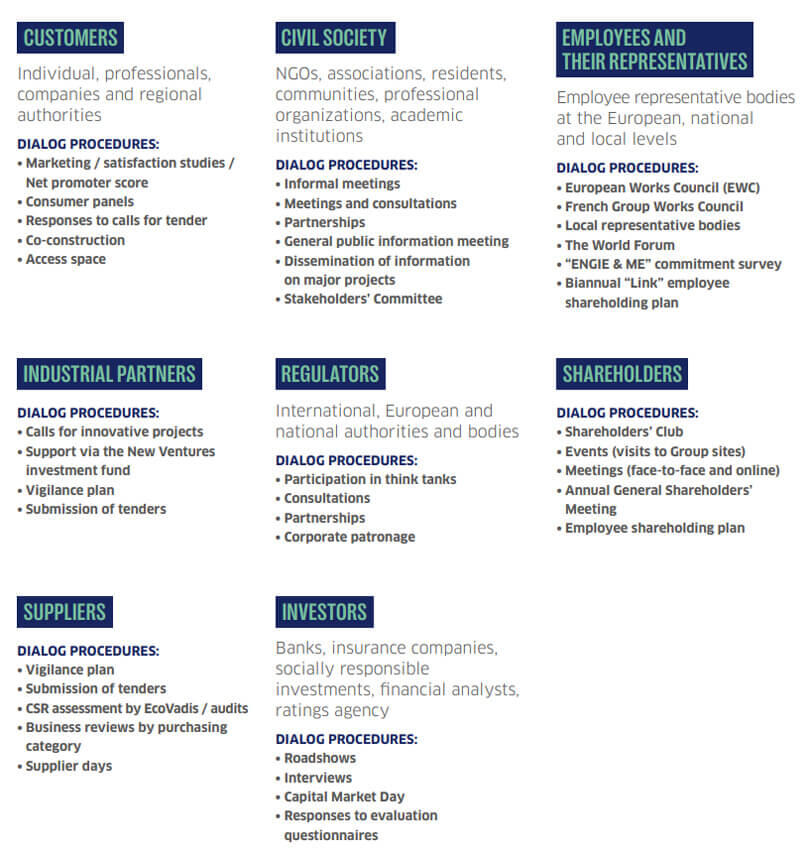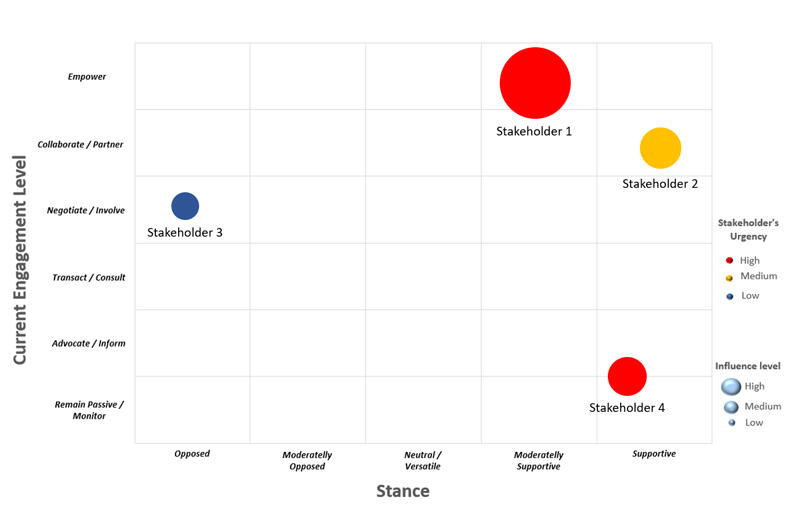Stakeholder dialogue is part of ENGIE’s development strategy. It is a key part of the Group’s ESG policies, and it lets us identify risks while simultaneously providing the resources we need to prevent, reduce, or compensate for the various business, social, and environmental impacts of the Group’s work. Stakeholder dialogue is also part of the Group’s strategy, adding value to our commercial offering and our interaction with local communities. It complements our environmental policy, with which it is closely linked.
ENGIE's stakeholder dialogue comprises several elements: a Group objective, self-assessment by operating entities, a toolbox and training program, and operational support from the ESG Department.
Among our stakeholders, we pay particular attention to local stakeholders, such as affected communities, local communities and indigenous peoples.
A target for stakeholder engagement
ENGIE includes dialogue with its stakeholders in its 2030 objectives:
"100% of the Group's activities provided with societal plan for dialogue with stakeholders.” In 2024, 54% of the Group's activities have such a plan.
This target will make sure that the stakeholder dialogue policy is rolled out across the entire Group. The annual progression of this objective is shown below:
| People | 2022 | 2023 | 2024 | TARGET | |
| Stakeholder engagement approach | Proportion of industrial activities with a societal plan for consultation with local stakeholders | 46% | 49% | 54% | 100% |
A self-assessment system for this target, implemented on an operational level
Each year, each operational site or activity will assess its level of stakeholder dialogue, using the reference formulated for the entire Group. This self-assessment reference is based on the AA1000 standard for stakeholder management, developed by the NGO Accountability, an international institution known in the ESG field. By applying the reference, we guarantee a standardized approach to all of the Group’s activities.
The Group’s ESG Department will compile the data produced by each operational site and propose a standard methodology to structure the stakeholder dialogue, respond to the reference’s assessment, and aggregate data on a Group level. This method contributes to the calculation of the indicator linked to the objective of 100% coverage of activities through dialogue with stakeholders.
Potential risks associated with stakeholder engagement are identified in advance. These potential risks may include stakeholders refusing to engage with the company, stakeholders opposed to the company's activities or conflicts between stakeholders.
A toolkit designed with and for operational entities
The toolkit is based on a six-step structured dialogue (Stakeholder Engagement process), that includes actions like analyzing the context for every situation, an exhaustive identification of stakeholders for the challenges in question, and the compilation, tracking, and impact assessment of an action plan. The process also becomes a management tool, by generating maps of stakeholders and associated engagement work.

The toolbox also includes everything that operational teams may need for their dialogue initiatives, such as guides to holding community meetings or mastering participatory tools.
A training program rolled out company-wide
With ENGIE University, we have developed and rolled out a training program within the company, which is tailored to each different professional and cultural context. It consists of a blend of interactive activities (80%) and academic presentations (20%).

To conclude, these tools and methodologies are what structures the Group’s corporate and social responsibility initiatives, combining ambition and adaptability. Our ambition is to be a reference company for our territories and our customers, be they local authorities, private individuals or industrialists, who can count on a responsible company serving the community. This ambition is tailored to every region and every situation through the Group’s policy, designed in partnership with our operational teams.
Stakeholder dialogue procedures and examples
The main forms of dialogue with the main stakeholder groups are illustrated below, in a non-exhaustive way:

Among these procedure, we can mention the Stakeholder Committee and the Dialogue and Transition Forum.
The Stakeholder Committee is a regular, voluntary, multidisciplinary meeting chaired by Jean-Pierre Clamadieu, Chairman of the Board of Directors and Catherine MacGregor, Chief Executive Officer. Its aim is to organize a dialogue on ENGIE's strategic orientations, and more specifically on its corporate social responsibility commitments, which are an integral part of its performance. The Committee's recommendations are followed up.
In addition, since 2016, the Group has had a space dedicated to dialogue, the Dialogue and Transition Forum, which enables operational teams to exchange views, especially with civil society players on topics related to territorial dialogue and stakeholder involvement, within the framework of the energy transition.
As described in the Stakeholder Engagement process, for each project, stakeholders are identified as early as possible, and are the subject of an action plan setting out the dialogue procedures adapted to the context and challenges of the project. Successful implementation of this process is an integral part of project assessment criteria.
Complaints mechanisms are put in place and shared with all stakeholders. We ensure that everyone has access to them, including indigenous peoples and local communities.
Example of a stakeholder mapping matrix: their position and level of dialogue with the project under analysis.

Example of stakeholder engagement and dialogue : Cuxtal II gas pipeline project (Mexico) :

The Cuxtal II gas pipeline project passing through Tabasco, Chiapas, Campeche and Yucatan took more than 3 years of negotiations with the Federal Electric Commission (CFE), with a two-year consultation period for the populations affected, from February 2022 to January 2024. This process was carried out in accordance with the provisions of Mexican legislation and the International Labor Organization Convention 169 on Tribal and Indigenous Peoples.
ENGIE Mexico organized 217 meetings attended by nearly 15,000 people. The aim of the consultation process was on one hand to establish the initiatives through which ENGIE will relate to the communities and stakeholders that are in the area of influence of the project to address the social impacts that will be generated in the preparation, construction and operation phases and on another hand to take into consideration their social conditions, needs and presence of indigenous population, with a perspective of human rights and share value.
The Social Impact Assessment determined the existence of 38 indigenous localities in the states of Yucatán and Campeche, for whom a free, informed and prior consultation process was mandatory. The process was led by the Energy Minster and after a historical process the 100% of the communities have given the consent for the development of the project.
ENGIE put in place a social management plan aiming at preventing and mitigating the impacts, communicating with local communities (location, duration, size, scope and purpose of the project ; complaints and suggestions) and developing social investments (access to clean energy, drinking water, reduction of the environmental footprint). As part of the agreements, the implementation of 116 social benefits was decided. To date, ENGIE Mexico has started with their implementation in order to be completed in December 2024.
ENGIE Mexico also decided to implement a local supplier program to train and integrate local suppliers into the value/supply chains in compliance with market and company guidelines, consolidating the positive local impact and the status of potential suppliers, contracting them with the company's fiscal, reputational, environmental, social, governance and economic requirements.
